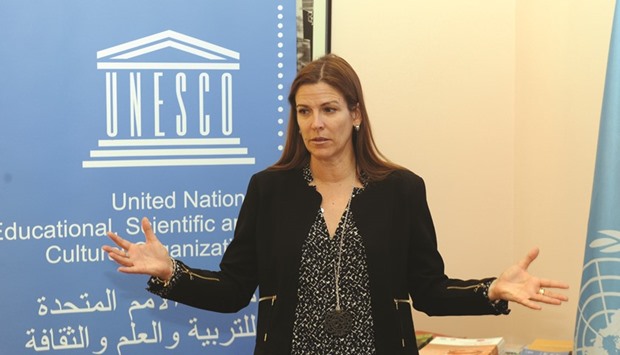The United Nations Educational, Scientific and Cultural Organisation (Unesco) Doha Office will remain upbeat in its efforts to promote and scale up the floating mangrove project in Qatar.
“We are trying to find more partners from the private sector for the project. We know the pilot went very well, but we need to scale it up,” Dr Anna Paolini, director, Unesco Representative in the Arab States of the Gulf and Yemen, said at a press briefing yesterday.
Described as “a highly important environmental initiative” that will significantly sequestrate carbon emissions not only in Qatar but globally, she stressed that the idea was picked up by other Unesco offices in different parts of the world. She believes it is easier for their colleagues to present this idea to their partners due to larger mangrove populations in countries where they operate. In Qatar, Dr Paolini said they are planning to contact the authorities in charge of the various marina in a bid to push for the scaling up of the project. “This is to show the results and see whether they are interested in sponsoring a larger pilot. In terms of carbon sequestration, which is a main issue here in Qatar, I think a project like this will help,” she added.
“Also, it will be nice to see greenery in the marina that does not require any water for growing the floating mangroves,” the senior Unesco official noted.
She described such initiative as a win-win situation: greening areas and helping to sequester carbon with a very low maintenance structure.
“It is quite unique in Qatar if they pick it up,” she pointed out, expressing optimism on the positive results of the project, which was launched in April 2013 at Lusail Marina. The idea is to develop carbon sequestration prototypes in Qatar, which could be used in various parts of the world. However, Unesco lamented that no donor has come to fund the $2.5mn five-year project.
“Unfortunately, until now our interactions have not been successful but we did not give up, we continue to promote these activities,” Dr Paolini stressed.
Unesco ecological sciences adviser Dr Benno B?er, who was previously assigned in Qatar, had told Gulf Times earlier that the project will provide answers on how financially feasible it is, what is the best design and engineering technology, and how the systems can be turned profitable through biosaline marine agriculture, the production of biofuel and other cash products.

Dr Anna Paolini speaks at a press briefing yesterday. PICTURE: Shemeer Rasheed

